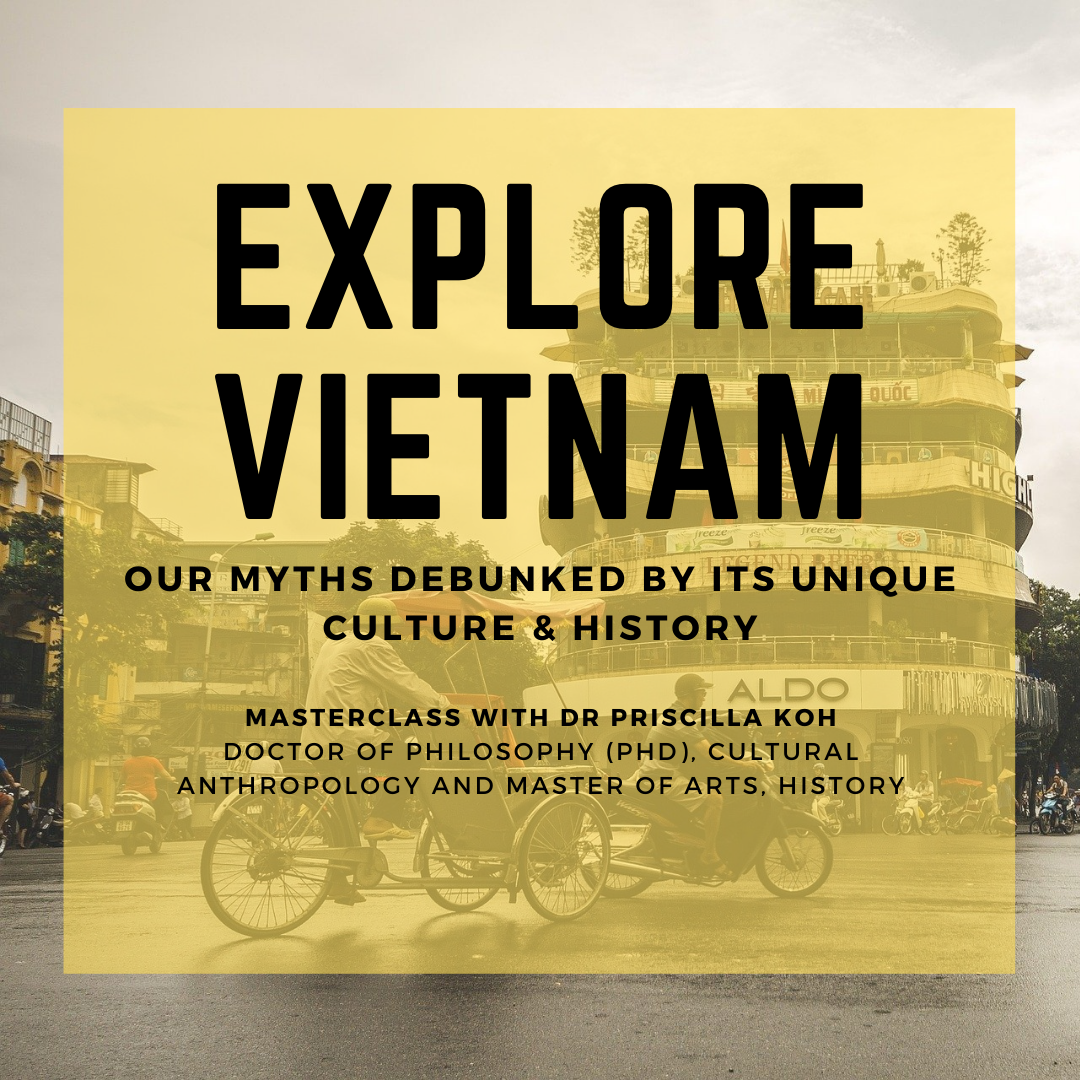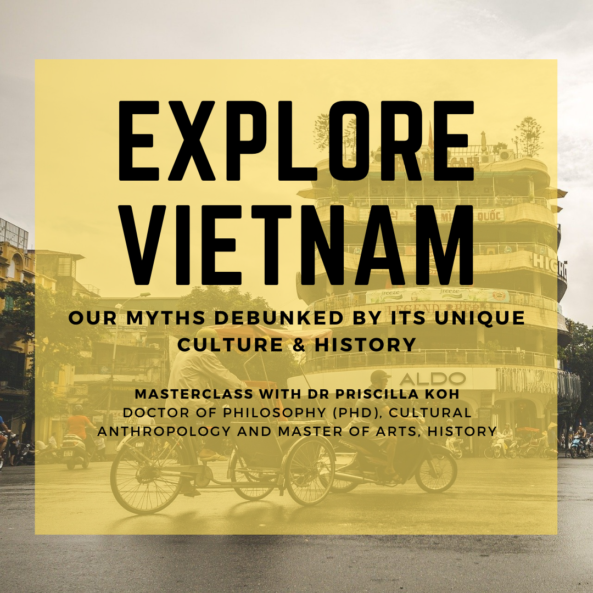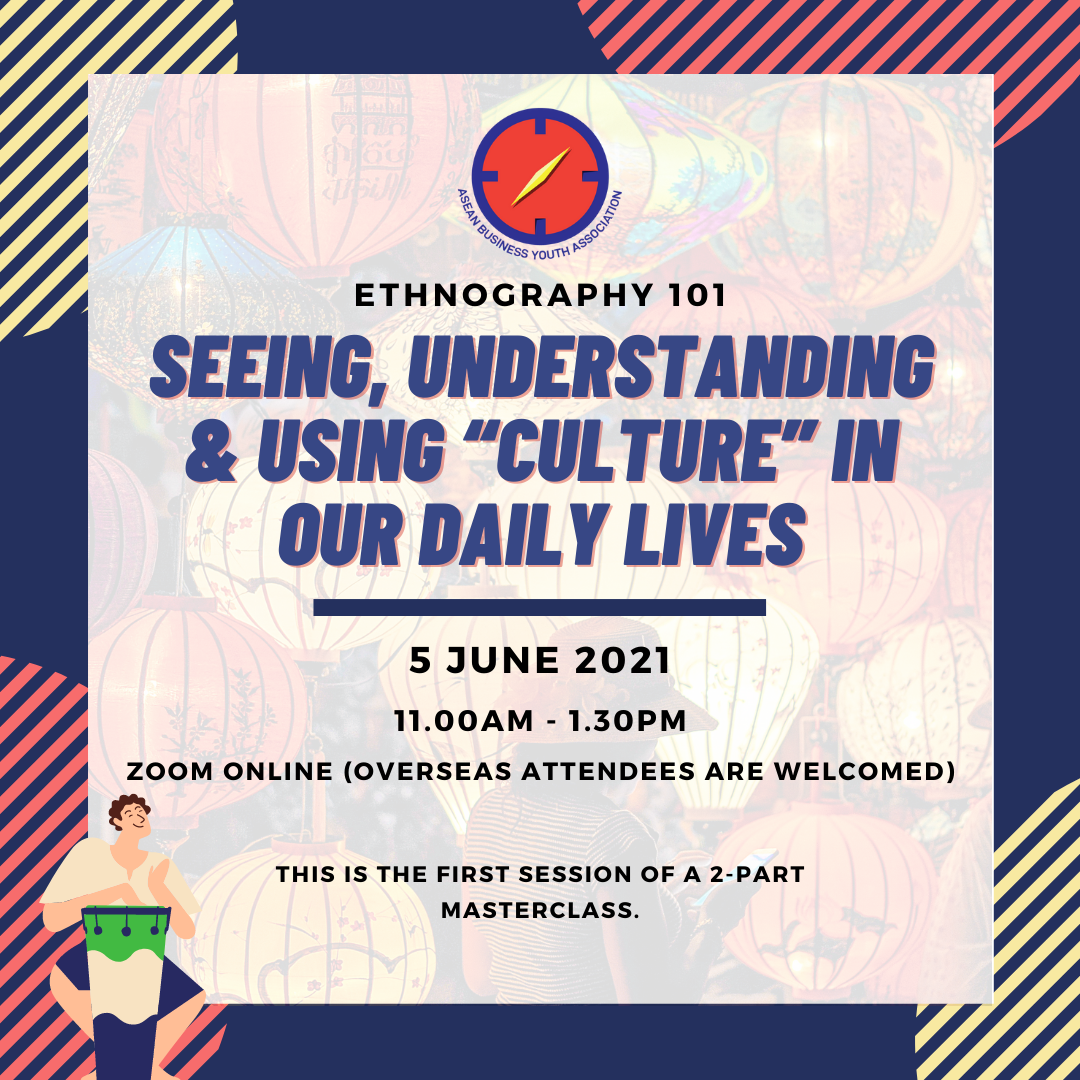
Xin Chao Cac Ban!
And so began our session with Dr. Priscilla Koh, with a friendly greeting that one would typically hear in Vietnam.
Written by: Jiayu Qiu
Edited by: Isabelle Goh
Overview
“Explore Vietnam: Our Myths vs Its Unique Culture & History” is ABYA’s first culture masterclass, conducted by Dr Priscilla Koh. She is an anthropologist and historian who has lived and worked in Vietnam, Thailand, Holland and Canada. We were thus taken on a journey as we viewed Vietnam, from her anthropological perspective on ethnic identities and marginalised communities.
The session started with a quiz inviting the participants to rank the main themes which they believed define Vietnam’s history, culture and identity. For many, their impressions of Vietnam were tied to what they knew about the Vietnam War. It was thus no surprise, that “Grit, Resilience, Determination” emerged as the top theme, followed closely by “The War”.
Turning Personal Interest to Research
Dr. Koh focused the discussion on sharing the origins of her unique interest and perspective on Vietnam, from an anthropological view point – having lived and worked in Vietnam for over a decade. As an undergraduate at the National University of Singapore (NUS) History Faculty in the 1990s, Dr. Koh realised during her student days that existing knowledge and writings about Vietnam tended to be shaped by the American perspectives of the Vietnam War. There was a dearth in scholarship and understanding of the country, history, people and culture from a Vietnamese perspective.
For her final year undergraduate dissertation, Dr. Koh conducted research on Vietnamese women at war, learning about how Vietnamese women had actively participated in warfare for a long time throughout Vietnam’s history. For her graduate research, Dr. Koh examined the history of ethnic minorities in Vietnam, before finally turning to explore the narratives of the “Viet Kieu” – former refugees who recently retuned to Vietnam after fleeing the country in the immediate aftermath of the Vietnam War – for her doctoral studies.
Return to Roots, Search for Identity and Staying Connected
Dr. Koh’s fieldwork on overseas Vietnamese or Viet Kieu (conducted between 2008 and 2012) found that while the older generation tended to remain silent about the trauma of the War and the refugee experience, the younger generation were both curious and troubled by the ‘silence’ surrounding these experiences. Dr. Koh’s research unravelled the narratives of Viet Kieu returnees – primarily those who had left Vietnam as young children and who were returning to Vietnam to live and work.
The returning Viet Kieu – both old and young – the return trips can be considered pilgrimages that can bring new beginnings, re-establish connections and also serves as closures to a painful and difficult past. The prominence of such activity is in fact upheld through social media today. Online communities facilitate diverse social exchanges, such as the Facebook Group for ex-refugees trying to reconnect with Singaporean volunteers and friends whom they met during their stay in Camp Hawkins, Singapore’s first and only refugee camp that was set up for the Vietnamese Boat People in 1978 and closed by 1996.
As shared by Dr. Koh, her study found that while concepts of home and belonging are often very fluid, it is clear from the Viet Kieu’s experiences that the pull of ancestral ties remains strong. As these young ex-refugees grow into early adulthood, going back to Vietnam fulfilled their curiosity to understand Vietnam on their own terms as part of their quest for identity.
The desire to return to the motherland has been facilitated by the Vietnamese government’s measures to encourage overseas Vietnamese to come back and contribute their resources to Vietnam’s development.
Identifying Influences on Culture and Values
In delivering a breadth in overview of Vietnamese history, starting from the time when Vietnam was colonised by China from 111 BC – AD 938, Dr. Koh elucidated that certain Confucian influences which originated from Chinese colonial rule continues, are intricately linked to Vietnam’s contemporary cultural beliefs and practices, and social relations.
Apart from the widely perceived Confucian emphasis on political order, social hierarchy and value systems, Dr. Koh shared that the esteem for education, teachers and scholars is something that is particularly striking in Vietnam. Teachers’ Day is celebrated like National Day in Vietnam. She had recounted how students would dedicate time to show appreciation to ex-teachers, such as by receiving them at the airport and throw a welcoming party for them, such as herself who had experienced this, despite having only taught the students for a few months, as part of volunteer work.
The importance of Confucianist values is also exemplified in a classic of Vietnamese literature: the poem The Tale of Kieu, written by Nguyen Du in 1820. The Tale of Kieu is about the trials and tribulations of a young woman named Kieu, who sacrifices herself in order to save father and younger brother from prison. Throughout the many trials and tribulations in her life, Kieu remains pure, chaste and filial. Kieu has become a cultural symbol of Vietnam, embodying important Confucianist values such as sacrifice for the family.
Locating its History in Time
After the Chinese domination came the monarchical period, during which the boundaries of modern-day Vietnam were defined. Dr. Koh shared that the home of the original Vietnamese actually lay in the northern parts of Vietnam near the Red River, but through the 11th – 19th centuries, during a period called Nam Tien (i.e. Southern expansion), the Vietnamese slowly spread to the south by conquering lands that were originally populated by minorities and other kingdoms, such as the Kingdom of Champa.
Vietnam’s dynastic period, however, ended when the French colonised Vietnam, from the 1880s to 1954, when the French lost the Battle of Dien Bien Phu against Ho Chi Minh and the Viet Minh. Despite this defeat, elements of French influence continue to live on in Vietnam today. For example, 7% of the Vietnamese population are Roman-Catholics; French colonial houses and opera houses can still be found in Vietnamese cities; and last but not least, Banh Mi continues to be a beloved Vietnamese version of the French baguette.
Associating the Multicultural Influences
Present day Vietnam has vestiges of the distinct cultural influences of the different historical experiences with the Chinese, French, Americans and the former Soviet Union. Between the 1950s to the 1980s, the influence of Marxist-Leninist ideology and the Soviet Union politics also loomed large. While Vietnam had tried to implement a centrally planned socialist economy, its economic failure eventually led to the abandoning of socialist economic principles in the 1980s, through a set of reforms known as “Doi Moi”., There is also a significant Vietnamese diaspora in parts of Eastern Europe as some Vietnamese went to countries like Poland, Czech Republic, etc. as students or expats, as part of the Soviet alliance.
In addition, it was also the French missionary, Alexandre de Rhodes, who created the romanised version of the Vietnamese language that is commonly used in writing today – the Quoc Ngu. Prior to de Rhodes, the Vietnamese language was spoken by the masses, but the written form only existed as Chu Nom which was influenced by Chinese and only available to the elites.
Quoc Ngu allowed de Rhodes to spread the Christian faith among the natives, but interestingly, it also eventually allowed Ho Chi Minh to spread his anti-colonial ideas widely among the Vietnamese people. Parts of Ho Chi Minh’s nationalist, anti-colonial movement was therefore unintentionally enabled by the French themselves – Ho Chi Minh also notably cultivated his ideas about nationalism during his time in Paris, another unintended result of French colonialism.
Takeaways
Overall, Dr. Koh’s sharing made it clear that there is truly much more to Vietnam’s history, culture and people, that go beyond the war. Importantly, she pointed out how concepts such as Tinh Cam (Sentiment), Quyet Tam (Determination) and Que Huong (Homeland), have deep roots and meaning in Vietnamese history, culture and society, are key to understanding what the country and people are.
Inspired, Jiayu recounts her experiences and learnings from the session.
“As a recent graduate of politics and anthropology, I found Dr. Koh’s commitment to sharing the stories told by the Vietnamese people themselves deeply inspiring. While some of the other ABYA participants had visited Vietnam, I have yet to visit the country and this cultural masterclass made Vietnam one of the top countries I would like to visit once travel restrictions are eased.”




